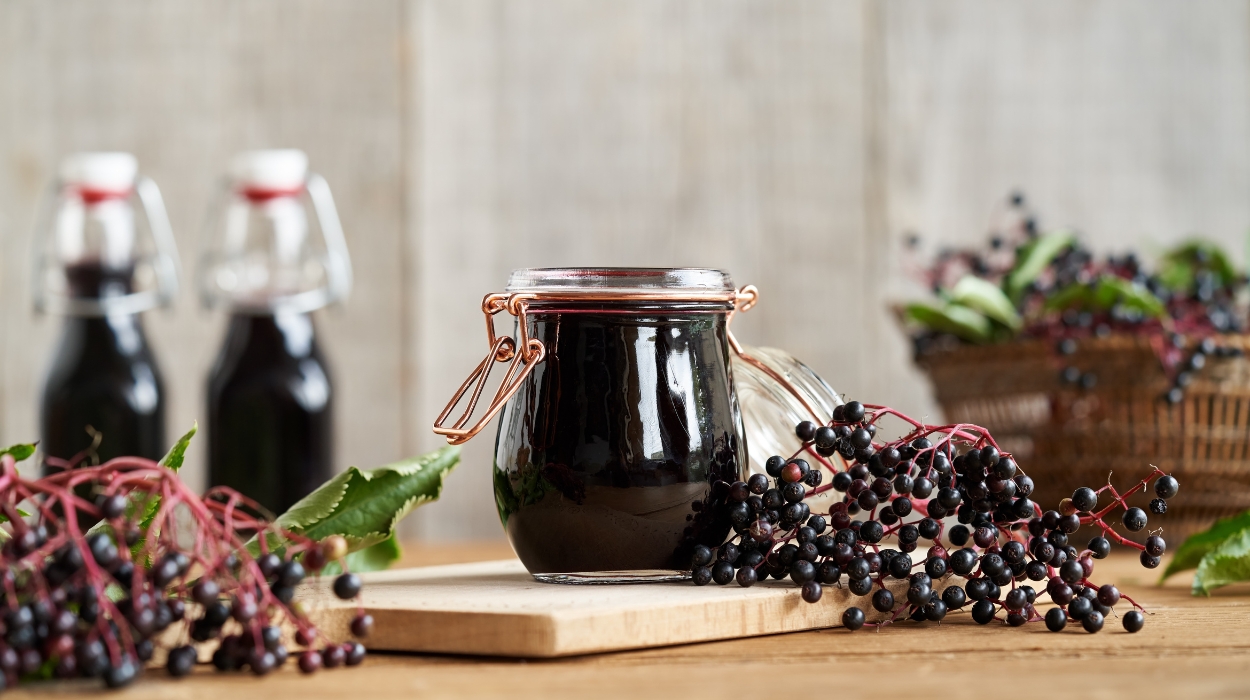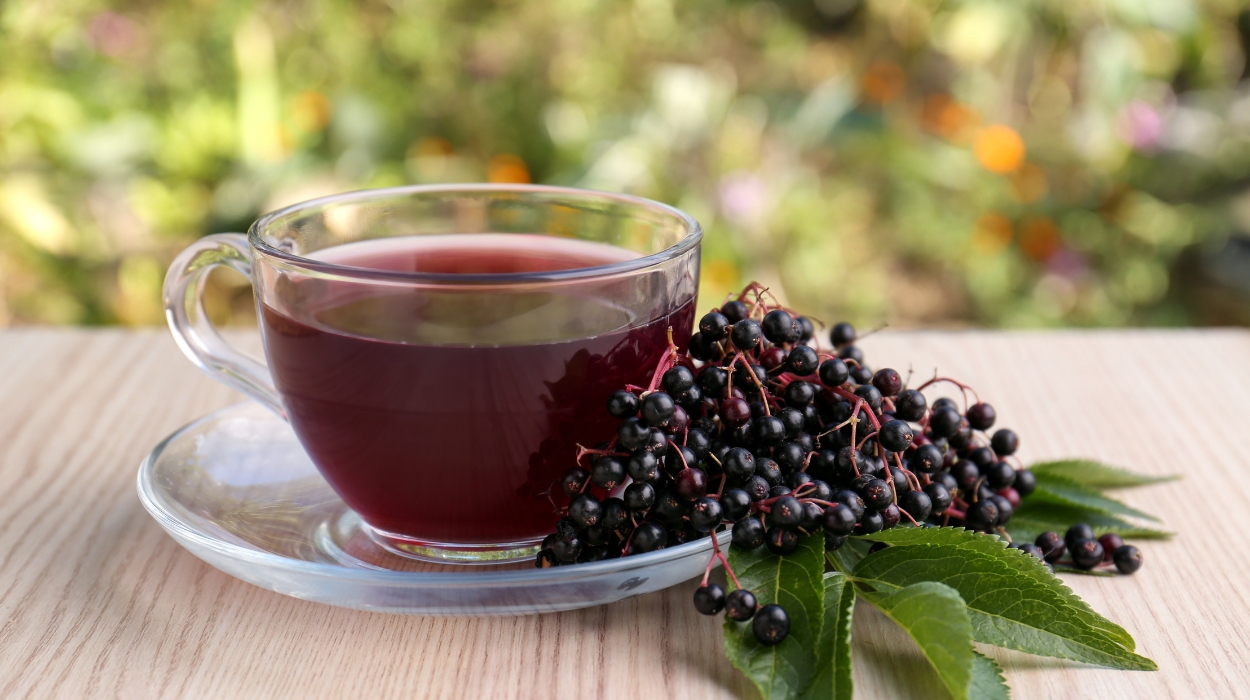Elderberry for kids has become a trending topic on social media. Elderberries are high in antioxidants like vitamin C, but does that make them worth it?
After all, oranges, berries, and even broccoli are full of the same vitamins and beneficial plant compounds. They also contribute to a healthy amount of fiber needed per day for weight management and total body health.
Learn what the science has to say about elderberry for kids.
Is Elderberry For Kids Safe?
It depends. Elderberries can be safe when consumed from a properly prepared product and taken in correct amounts.
However, elderberry products aren’t regulated by the FDA and may have false claims or amounts. Toxicity with severe adverse effects is possible, which is why it’s not generally recommended.
You can get all the vitamin and antioxidant benefits that elderberries offer from safer fruits and vegetables, like citrus fruits, berries, and broccoli.
Is Elderberry Safe For Kids?

Like most berries, elderberries[1] are rich in antioxidants,[2] flavonoids,[3] and vitamins for gut health. Its nutrient-rich compounds help total body functioning, including immune health for the common cold and flu season — which is why it’s a growing trend.
However, it’s not a cure. A healthy diet and lifestyle are your best bet[4] for keeping you and your kids healthy.
So while elderberry syrup might be going viral to fight colds, the truth is that there isn’t enough research to support its usage.[5] While there is some evidence[6] of its benefits, studies are for adults and don’t use enough participants. Nevertheless, elderberries can be safe for kids over five years[7] of age when taken by mouth for no more than 72 hours.
Unregulated Elderberry Supplements
Another reason why elderberries for children aren’t recommended is that supplements aren’t regulated by the FDA. That means that their quality and concentration can’t be trusted. This is important to note as the improper preparation or amount of elderberries can lead to toxicity and dangerous side effects.
Elderberry Toxicity
Elderberries can’t be eaten raw, and improper preparation can create serious health issues. The raw berries, leaves, and stems of the elderberry plant, or Sambucus nigra, have cyanogenic glycosides, which can release cyanide. Toxicity can lead to:[8]
- Gastrointestinal symptoms: Nausea, vomiting, abdominal cramps, and diarrhea.
- Weakness and dizziness: Rapid heart rate, weakness, and dizziness.
- Respiratory issues: Rapid and shallow breathing, potentially leading to respiratory failure.
- Neurological effects: Headaches, confusion, agitation, and seizures in severe cases.
While commercial preparations work to ensure the toxins are removed, you can’t be 100% certain since they aren’t regulated.
Children’s Developing Immune Systems
Even if an elderberry product can be trusted, the immune system of a child is still sensitive[9] as it’s just developing. The reaction to dietary supplements given for an illness such as a cold or the flu can differ greatly from adults.
If sick or suffering from an illness, speak to your pediatrician. If you suspect your child has COVID,[10] do not give elderberry. Honey can soothe a sore throat, except not for an infant as there are botulism concerns.[11] You can also speak to doctors about gut health drinks or other gut health supplements for immune health if needed.
How Much Elderberry Is Safe For Kids?

There’s no safe amount of elderberry recommended[5] for kids. There isn’t even enough research to support its usage, which is why there’s a lack of standardized dosing guidelines.
A supplement’s appropriate amount depends on many factors, such as age, weight, medication, health condition, and other ingredients involved.
Most manufacturers will offer dosing instructions and serving sizes for elderberry syrup or gummies based on age and weight. However, these guidelines are general and companies aren’t legally obliged to provide accurate claims on their supplements.
Parents should be aware that while trendy for cold and flu season, elderberries are not guaranteed to be helpful. They may cause adverse reactions. Elderberry for infants, babies, and toddlers — or those under five, should be avoided entirely.
Safe Immune-Boosting Fruits And Vegetables
To boost your sick child’s immune system, offer rest and other safe fruits and vegetables. Like elderberries, you can also consider those high in vitamin C[12] — an antioxidant involved in wound healing and immune function.
Fruits and vegetables high in vitamin C and fiber include
- Strawberries.
- Citrus fruits.
- Papaya.
- Kiwi.
- Kale.
- Broccoli.
- Red peppers.
Elderberries also contain phenolic acids,[1] which are immune-boosting antioxidants. You can find them in many safe fruits and veggies like blueberries, blackberries, cherries, and even dark chocolate.
You can avoid the high cost of elderberry supplements, along with their health risks to your baby or child, by choosing other fruits and vegetables.
Things To Consider Before Adding It To Your Kid’s Diet
If you’re thinking about adding elderberry to your child’s diet, follow these steps:
- Speak to a healthcare professional: Before even buying elderberry products, speak to your doctor. Elderberry is not safe for patients with autoimmune diseases, certain chronic conditions, cancer, or patients with cross-allergies with honeysuckle.
- Check for allergies: As with any new food or supplement, there’s always the risk of an allergic reaction. Start with a very small dose and monitor side effects, such as difficulty breathing, hives, or gastrointestinal distress.
- Look for high-quality products: Make sure you research the best fruit and vegetable supplements or syrups before giving them to your child. Find a brand that’s transparent about its ingredients and manufacturing process. Choose products specifically formulated for children with appropriate serving sizes.
- Start slow and stay vigilant: After checking for allergies, slowly introduce the product. Never go above the recommended serving amount, and stay vigilant of side effects.
- Avoid sugary options: Choose products without added sugars or unnecessary additives. Too many grams of sugar per day negatively affects health, so going natural is best.
- Note other ingredients: Check if there are any other herbs or supplements in the product — they could interact with medications or have their own set of side effects.
Keep in mind that elderberry syrups, gummies, and lozenges will all have varying amounts of elderberry, along with other ingredients. Read the labels fully and speak to your doctor before introducing it to your child.
Conclusion
The lack of research and regulation in elderberry supplements makes it something to think twice about. While it’s rich in antioxidants like vitamin C, other safer fruits and vegetables offer the same benefits — without the high supplement cost or health risks.
Ultimately, the safest approach is a balanced diet and healthy lifestyle for your child’s well-being.
Frequently Asked Questions
Yes, you can give your child elderberries but be aware of the risks involved, such as toxicity or allergic reactions. The healthiest fruits and veggies can offer the same benefits without the risks or high price points.
Elderberry in toddlers can create side effects such as nausea, vomiting, diarrhea, or allergic reactions. Elderberry is not recommended under five years.
None, if under five. There’s no doctor-recommended appropriate dosage. Amounts depend on age, weight, and health condition. Speak to your doctor first.
Doctors don’t recommend elderberries for kids because of their potentially adverse health effects. Other fruits and vegetables are safer and offer the same benefits as berries.
 Evidence Based
Evidence Based
